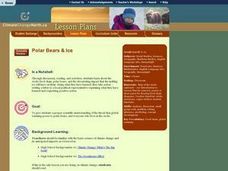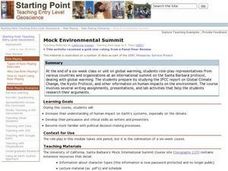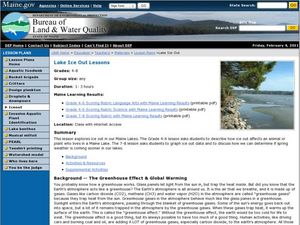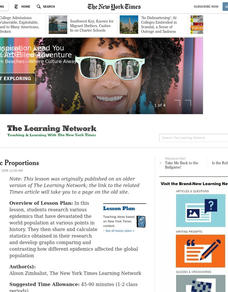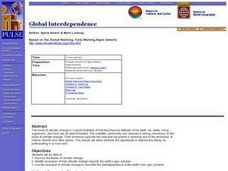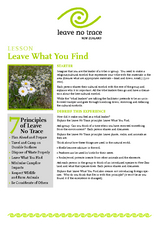Curated OER
Polar Bears and Ice
Students explore the Arctic food chain. They examine the needs of the polar bear and the threat that global warming poses to them. Students write a letter to a local political representative explaining what they have studied and...
Curated OER
Mock Environmental Summit
Learners increase understanding of human impact on Earth's sytems and the climate. They develop persuasive and critical skills as writers and presenters. They become familiar with political decision making processes.
Curated OER
Some Like It Cold
Sixth graders study Canada's northern territories and four settlements above the Arctic Circle. In this northern Canada instructional activity, 6th graders maps and timelines to locate physical, political, and economic features of...
Curated OER
Lake Ice Out Lessons
Students explore the greenhouse effect. In this environment lesson, students describe how "ice out" affects animals and plants who live in a Maine lake. Students graph "ice out" data and make predictions about the upcoming weather.
Curated OER
Global Winds
Students extend their understanding of convection to consider global winds and the effect of the earth's rotation on the creation of patterns of prevailing wind direction.
Curated OER
Local and Global Impacts
Students conduct an interview with Dr. Hajo Eicken to discuss local and global impacts. They hold an audio conference to ask about characteristics of the Arctic environment, climate, climate change, the greenhouse effect and global...
Curated OER
Trading Nations
Students analyze the impact of a global economy on the workers, business leaders and governments of China and the United States.
Curated OER
Epidemic Proportions
Students research epidemics that have devastated world population at various points in history. They share and calculate statistics obtained in their research and develop graphs comparing and contrasting how different epidemics affect...
NOAA
Marine Policy
Save the oceans! The 22nd installment of a 23-part NOAA Enrichment in Marine sciences and Oceanography (NEMO) program focuses on laws and marine policy. Pupils take part in an activity investigating fisheries stock data.
Curated OER
World Geography: Global Interdependence
Students are able to discuss the theory of climate change. They identify examples of how climate change impacts the earth's geo-spheres. Students are able to use the example of climate change to describe the interdependence of the...
Curated OER
Satellites and the Radiation Budget
Students engage in a prelab discussion about the earth's radiation budget and global warming. They use "trading cards" to find specific websites to research radiation budget questions.
Curated OER
Graphing the Facts
Students investigate the correlation between our planet's weather and solar activity. They analyze and discuss data regarding the solar activity cycle, graph annual precipitation and temperature averages over a period of 100 years, and...
Curated OER
Debate Topics and Ideas
Students examine both sides of arguments surrounding given debates. They use the internet and other research to collect information to support their stand on the controversial issue. Students debate their chosen topic. This lesson plans...
Curated OER
Changing Weather: Comparing Climate from Voyageur Times to Today
Fifth graders compare climates. In this weather lesson, 5th graders observe and record weather observations and discuss the impact of weather on people. Students also discuss the concept of global warming and determine how weather...
Curated OER
The Water Cycle and Global Warming
Students study the flow of water in the environment. In this water cycle lesson students evaluate the consequences of changes in the water cycle using data.
Curated OER
Global Warming: The Greenhouse Effect Visualizer
Students work in small groups to study the various aspects of global weather and discuss the possibility of a Greenhouse Effect.
Curated OER
Leave What You Find
Young scholars explore environmental awareness by participating in a role play activity. In this cultural analysis lesson, students discuss the importance of symbolism when referring to a tribe and create their own tribe based on a small...
Wild BC
Is Climate Change Good for Us?
Is it really that big of a deal if the global climate undergoes a little change? Young environmentalists consider this very question as they discuss in small groups the impact of different climate change scenarios on their lives, their...
Polar Trec
Drawing Diatoms like Ernst Haeckel
Why do scientists rely on drawings rather than just photographs of their research studies? The lesson plan introduces drawings of microscopic organisms and the importance of accuracy. Young artists draw organisms and learn why focus and...
The New York Times
Revolt! Comparing Historical Revolutions
What elements are needed to have a revolution? How do historical revolutions from across the globe and generations compare with one another? This is an excellent activity that incorporates group work, source analysis, and an engaging...
Chicago Botanic Garden
Carbon, Greenhouse Gases, and Climate
Climate models mathematically represent the interactions of the atmosphere, oceans, land, sun, surface, and ice. Part two in the series of four lessons looks at the role greenhouse gases play in keeping Earth warm and has participants...
Chicago Botanic Garden
Climate Change Around the World
It is unknown if cloud cover increases in response to carbon dioxide levels changing, helping climate change slow down, or if cloud cover decreases, allowing Earth to warm faster. Part four in the series of five lessons has classes...
National Renewable Energy Laboratory
Biomass: Biogas Generator
It's a gas. Middle schoolers build a biogas generator following the directions in this resource. After a few days of observation, they demonstrate that the gas given off by the decomposing manure is flammable. The activity concludes as...
Curated OER
Global Warming: The Greenhouse Effect Debate
Students gather information about the Greenhouse Effect and participate in a debate about the merits of this theory on both sides. They explore the Greenhouse Effect, and its possible long-term effects, from a variety of resources.


